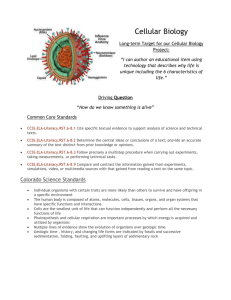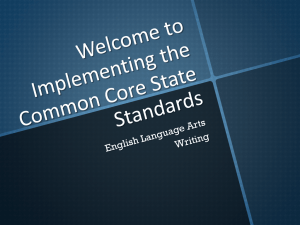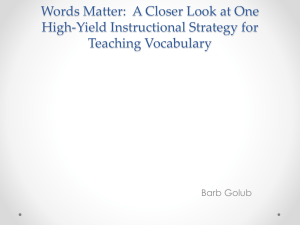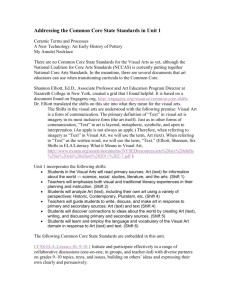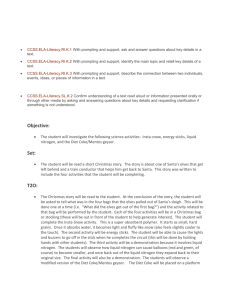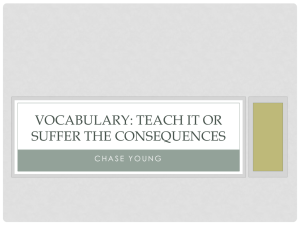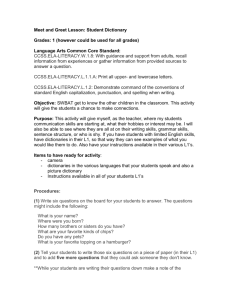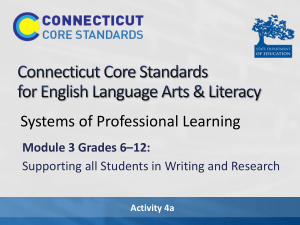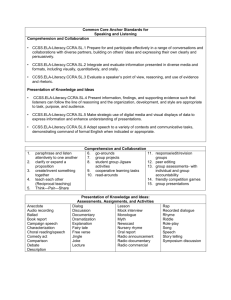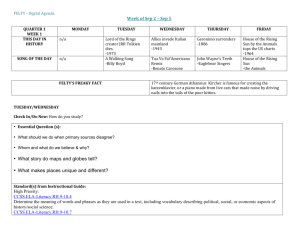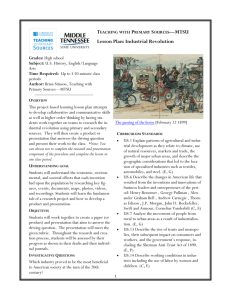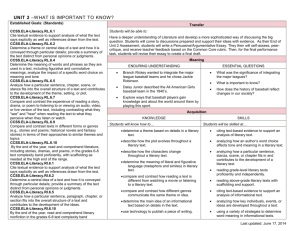ELA 11-12 Winter Dreams
advertisement
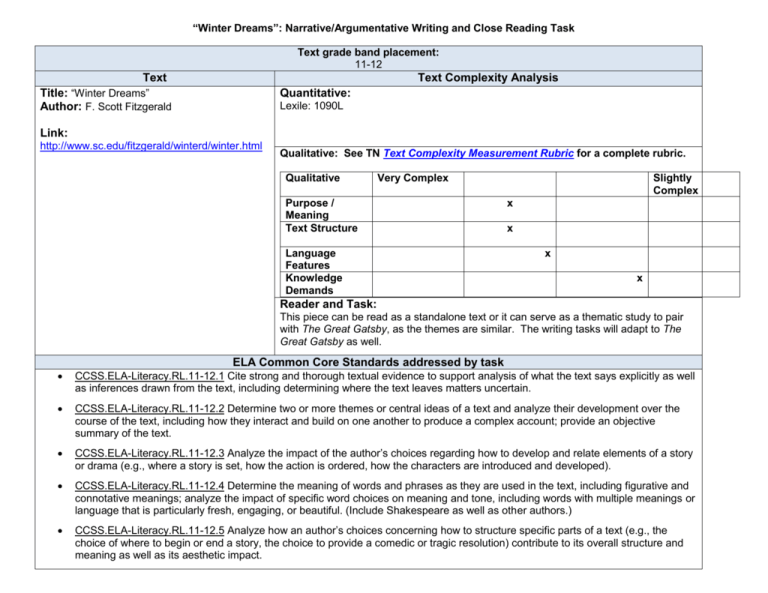
“Winter Dreams”: Narrative/Argumentative Writing and Close Reading Task Text grade band placement: 11-12 Text Text Complexity Analysis Title: “Winter Dreams” Author: F. Scott Fitzgerald Quantitative: Lexile: 1090L Link: http://www.sc.edu/fitzgerald/winterd/winter.html Qualitative: See TN Text Complexity Measurement Rubric for a complete rubric. Qualitative Very Complex Purpose / Meaning Text Structure Language Features Knowledge Demands Slightly Complex x x x x Reader and Task: This piece can be read as a standalone text or it can serve as a thematic study to pair with The Great Gatsby, as the themes are similar. The writing tasks will adapt to The Great Gatsby as well. ELA Common Core Standards addressed by task CCSS.ELA-Literacy.RL.11-12.1 Cite strong and thorough textual evidence to support analysis of what the text says explicitly as well as inferences drawn from the text, including determining where the text leaves matters uncertain. CCSS.ELA-Literacy.RL.11-12.2 Determine two or more themes or central ideas of a text and analyze their development over the course of the text, including how they interact and build on one another to produce a complex account; provide an objective summary of the text. CCSS.ELA-Literacy.RL.11-12.3 Analyze the impact of the author’s choices regarding how to develop and relate elements of a story or drama (e.g., where a story is set, how the action is ordered, how the characters are introduced and developed). CCSS.ELA-Literacy.RL.11-12.4 Determine the meaning of words and phrases as they are used in the text, including figurative and connotative meanings; analyze the impact of specific word choices on meaning and tone, including words with multiple meanings or language that is particularly fresh, engaging, or beautiful. (Include Shakespeare as well as other authors.) CCSS.ELA-Literacy.RL.11-12.5 Analyze how an author’s choices concerning how to structure specific parts of a text (e.g., the choice of where to begin or end a story, the choice to provide a comedic or tragic resolution) contribute to its overall structure and meaning as well as its aesthetic impact. CCSS.ELA-Literacy.W.11-12.1 Write arguments to support claims in an analysis of substantive topics or texts, using valid reasoning and relevant and sufficient evidence. CCSS.ELA-Literacy.W.11-12.3 Write narratives to develop real or imagined experiences or events using effective technique, wellchosen details, and well-structured event sequences. CCSS.ELA-Literacy.SL.11-12.4 Present information, findings, and supporting evidence, conveying a clear and distinct perspective, such that listeners can follow the line of reasoning, alternative or opposing perspectives are addressed, and the organization, development, substance, and style are appropriate to purpose, audience, and a range of formal and informal tasks. What key insights should students take from this text? Students should understand how characters develop in a story. Students should be able to discuss the intricacies of an artistic text. Students should contemplate how artistic works utilize language elements and rhetorical techniques to enhance the beauty of a text. Text-Dependent Questions Responses to the questions should enrich the conversation with clear and articulate responses that mine the text for support to show clear understanding or legitimate search for meaning. Responses should drive the conversation forward by providing insight or depth to the discussion by introducing topics that have not already been discussed, providing a different or more complete perspective to the topic, or respectfully challenging other responses. 1) The first line of the story states that “Some of the caddies were poor as sin.” What does this suggest about the characters and how does it help to establish a theme for the story? 2) What type of character is Judy Jones? Identify the many nuanced ways in which Judy Jones is described. How do the descriptions help to define her? 3) Why is Judy Jones usually referred to by her first and last name? 4) What type of person is Dexter? How does the narrator feel about Dexter? 5) What is a winter dream? Is the title appropriate for the story? What is/are Dexter‘s dream(s)? Why? Do his dreams fit his reality? 6) Is “Winter Dreams” a cautionary tale, a moral lesson, or something else? 7) “Careless” is a word frequently used in the text. Discuss how this word plays into the meaning of the story. 8) Dexter says he is newer and stronger than the careless, wealthy people he meets. What makes him so? Why then does he want his children to be like the careless, wealthy people? 9) The story is divided into six parts. What is the significance of each part? Writing Mode Writing Prompt Narrative This I Believe was a 1950s radio program which asked people from all walks of life—celebrities, corporate leaders, cab drivers, scientists, and secretaries—to articulate their beliefs. The goal was to get people to distill into a few minutes a guiding principle in which they believed. The three-minute essay focused on the core beliefs that guide daily lives. National Public Radio revived the concept a few years ago and collected some beliefs from contemporary individuals. The goal of the program is not to persuade Americans to accept the same beliefs; rather, the goal is to encourage people to begin the much more difficult task of developing respect for beliefs different from their own. (For more information, see http://www.thisibelieve.org/.) Choose a major character from the story. Write a This I Believe essay from the perspective of the character selected. While you construct your essay, consider the character‘s statements and his or her actions and behavior. Also, consider statements other characters have made about your character and ways that other characters treat your chosen character. This is not subjective; make sure that you stay true to the character that Fitzgerald created by integrating strong textual evidence to support your belief. Since This I Believe is in concept a spoken personal narrative, you may be asked to either record or present your narrative in oral form as the character. You should practice reading your essay aloud to capture the appropriate tone and verbal nuance to enhance the belief statement. Argumentative The “American Dream” is essentially the belief that everyone can achieve success with effort. It is a concept that has long permeated the psyche of our country. John Winthrop, founder of the Massachusetts Bay Colony, invoked Biblical teachings in 1630, proclaiming that the new world was a “city upon a hill,” a light to the world. The Declaration of Independence proclaims that “all men are created equal, that they are endowed by their Creator with certain unalienable Rights, that among these are Life, Liberty and the pursuit of Happiness.” Many critics have recognized the works of F. Scott Fitzgerald as depicting the crumbling of the American Dream. Write an argumentative essay in which you argue that Fitzgerald does or does not dismantle the American Dream in his text. Be sure to support your essay with strong textual evidence throughout. Your essay will be evaluated using the TN 9-12 Argumentative Rubric.
